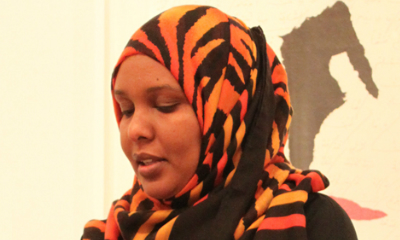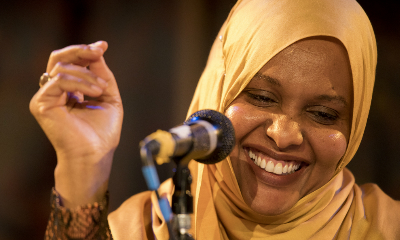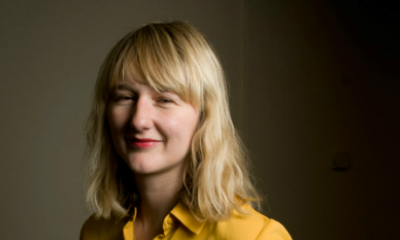I was pleased to be invited to work with a Somali poet by the Poetry Translation Centre. From a purely selfish perspective, I felt I would have a huge amount to learn from a poetic culture so radically different from my own, whilst as soon as I read Caasha’s work I also realised that – as young female writers – we have much in common.
At first I worked with Maxamed Xasan ‘Alto’ and Said Jama Hussein, who provided me with simple, literal translations from the Somali and also met with me to talk through the poems line-for-line and explain the cultural context. In Starbucks and libraries, the complex technicalities of Somali poetry were scribbled down for me on napkins, whilst I also learnt about khat, tribal punishments and camel fat. I began to get a glimpse of a Somalia beyond the news headlines, one which for many is the most beautiful, cultured country in Africa: the pearl of Mogadishu, lush Daallo, deer and honey. And I was also told about Caasha – what a remarkable poet she is, how boldly she takes on traditional (and often male) forms such as the gabay, her fierce technical prowess, the incredible outpouring of emotion in her work.
As I began to understand the poems, it soon became apparent that it is this remarkable contrast between wild feeling and controlled form – the hot and the cool – which I needed to capture. But how? There are many aspects of Somali poetry which can seem clumsy to an English ear: the politically charged rhetoric (readers in the UK often loathe the sense they’re being told what to think), the length and seeming bagginess, the extreme alliteration (entire poems often alliterate on just one letter), the shifts in address, the digressions. In fact, these poems are the opposite of clumsy, they just use techniques which are currently deemed ‘unfashionable’ on Creative Writing circuits (shifts in address are common in Ovid’s work, for example, who can hardly be accused of sloppiness).
It was tempting to make Caasha’s work more palatable for an English audience – to be both translator and editor, knocking off the awkward edges. But instead I decided to damn fashion. It would be ridiculous to tidy and tame such powerful poems. I just had to look outside the mainstream lyric for models.
Translating Caasha’s poetry is an experience that will definitely impact upon my own writing. It makes me want to tear up a lot of mainstream English poetry’s ‘rules’. The expansiveness and engagement of Somali poetry makes much work coming from the UK seem a bit cramped: it challenges us to be bolder. And Caasha has made me question many of my ingrained assumptions. When I told her how much of my work involves teaching creative writing, she giggled at the idea. ‘Writing can’t be taught,’ Caasha told me. ‘It is a gift from god.’ Looking at her poems, I can believe it.
Extraced from Translating Caasha Lul Mohamud Yusuf By Clare Pollard




